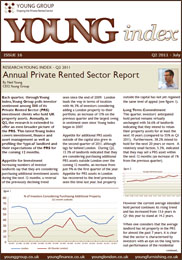November 30, 2009
by Neil Young
There was an article on the Sunday Times yesterday saying how Buy-to-let lives on. To me this seems a bit of a non story.
Over the last few years commentators have been speculating that buy-to-let does not have a future. Do these people not take note what is happening in the real world.
A few months ago we at Young Group wrote a paper which looked at the demographics of the UK going forward. One of the most obvious findings was the increase in ‘solo’ households – in 2006 it was 6.8 million, forecast for 2031 by the Communities and Local Government is for it to rise to 10.9 million, a 60%+ increase. This is driven by a selection of factors, including increased immigration, people marrying later, higher divorce rate, and importantly individuals wanting greater flexibility.
These points coupled with a growing population/households (in the same 25 year period, UK households are set to increase from 21.5 million to 27.8 million), lead to a need for more housing. However, many of these groups are unable to afford to buy – especially with the current difficulties in raising funds – therefore they look to the rental market.
The term buy-to-let came about in the late ’90′s when the Council of Mortgage Lenders (CML) worked with some lenders to offer more widely investment mortgages. However, there were many investors who had been doing this for years, it was not a new phenomenon but one that in many ways was just a case of rebranding.
For all the years I have been going to property events (MIPIM, Property Week’s Resi, etc) there has been a lot of talk about institutions such as Aviva, Legal & General, etc investing in residential property as was the case early in the last century. Apart from a few funds this has not materialised. It does make sense for them to invest in this asset class – and many are currently evaluating this as an option – but no action has taken place.
This has to be the biggest asset class where the individual investor has greater exposure than institutions. Despite the headlines of the last few years most who have invested in residential property are committed to it. Our recent Young Index survey shows that 98% of investors surveyed intend to hold for the next 12 months, with almost half planning on holding for at least the next 10 years. There are good returns to make out of this sector, seeing it as a long term investment is important.
So, let’s stop trying to kill off one of our oldest and most fundamental industries, and encourage it, as it is paramount for the future growth of the economy.








